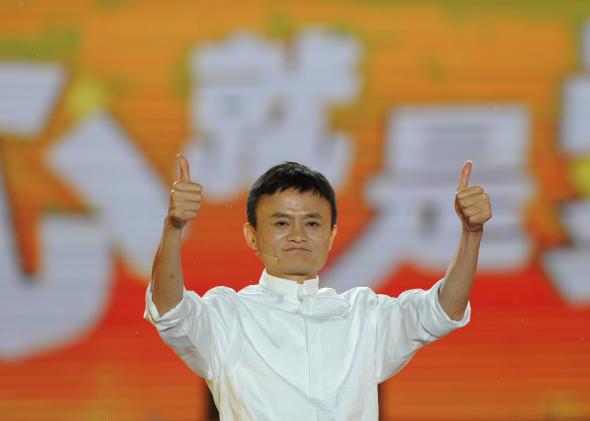How Alibaba Went From a Band of Thieves to a Huge E-Commerce Company

Photo by Peter Parks/AFP/Getty Images
How do you name a global conglomerate? Internet entrepreneur Jack Ma was in a San Francisco coffee shop one day when he pulled his waitress over to ask what she knew about Ali Baba. "Open Sesame," she responded. Encouraged, Ma took to the streets to see what passersby would have to say. He asked people from India, Germany, Tokyo, and China. And, he told CNN in a 2006 interview, they all knew something about Ali Baba and "Open Sesame." Easy. Global. Done. Ma registered the name.
Today Alibaba (one word) might be better known as a Chinese e-commerce giant than as the eponymous hero of "Ali Baba and the Forty Thieves," a classic tale from The Arabian Nights. In that story, Ali Baba is a poor woodcutter who stumbles on tremendous fortune after using the words "Open Sesame" to unseal a hidden vault filled with gold and treasure. The modern Alibaba hopes to encapsulate that spirit of serendipitous discovery as it connects buyers and sellers across the world. "Our platforms open a doorway to fortune for small businesses," the company explains on its website.
Whether the legacy and mystique of Ali Baba the character can hold up on a global scale will be a serious question for Alibaba the company as it pushes its already international brand across even more borders with its initial public offering, which it filed papers for on Tuesday. Branding experts agree that it's important for businesses to consider how their brand names will play worldwide. Branding expert and consultant Rob Frankel says Exxon was one of the corporations that did this best. "The name carried no pre-existing imagery or baggage," he explains. "Exxon did some major research and found that the rarest combination of letters was a double X. It was two syllables, one word, and everyone could pronounce it."
But that kind of foresight tends to be the exception, not the norm. More often than not, the naming stories of famous companies come back to the most obscure anecdotes and rationales. Caterpillar got its name in 1905 when a company photographer saw a tractor prototype being tested and exclaimed loudly, "If that don't look like a monster caterpillar!" Google comes from "googol," the mathematical term for 1.0 x 10100. Yahoo is an acronym for the nonsensical phrase "Yet Another Hierarchical Officious Oracle" and an allusion to a rude imaginary species in Jonathan Swift's Gulliver's Travels. If you're in on the joke, these names are amusing and even clever. To the average consumer, not so much.
Perhaps more interesting than the literary origins of Alibaba is another justification the company gives for its name: "It can be easily pronounced in practically all languages." It's a compelling claim, but does it hold up? I called Edward Flemming, a professor of linguistics at the Massachusetts Institute of Technology, to get his two cents. The simple answer: no, not really. One big problem with the word "Alibaba" is that certain languages don't understand or use the consonants in it. The vocal mechanism that creates the B sound in English isn't used in many others, Flemming explains, which instead substitute sounds like P, T, and K. The L consonant is even worse at crossing borders and can often be confused with the R sound.
If you want to be more nuanced about it, Flemming says the question really depends on what you mean by "pronounceable." Alibaba does have the advantage of being made from vowel-consonant-vowel sequences, and none of the consecutive consonant sequences that tend not to translate so well. The I vowel and the "ee" sound it makes are also fairly common across languages and cultures—so most people could probably hazard a guess at how it should sound. In that sense, Alibaba might be globally accessible. But universally pronounceable could be a stretch.
To hear a segment from Slate's The Gist about the pronounciation of Alibaba, click on the SoundCloud player below.

